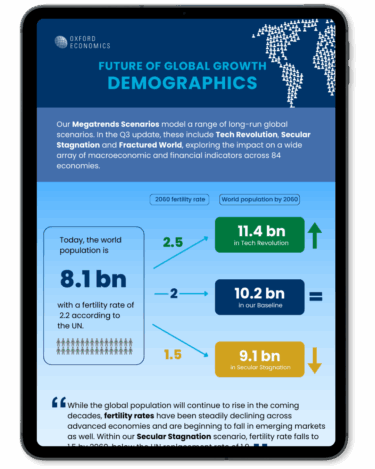Restricting competition in 5G network equipment in Romania

A new report by Oxford Economics sheds light on the potential costs of restricting competition in the provision of 5G network equipment in Romania. The study models the consequences for investment costs, rollout delays, and long-term productivity losses to the Romanian economy.
We estimate that the costs of replacing Chinese manufacturers’ 5G network equipment for operators could be around RON 4.4 billion to RON 4.9 billion in total (undiscounted) by 2030. The cost of extending and maintaining the 5G network is also estimated to increase by between RON 240 million to RON 530 million per year over the next decade, which, if passed on, would translate into an increase in increase in monthly mobile costs of between RON 3.90 to RON 8.60 for Romanian consumers.
Due to the increase in network equipment costs, between 1.3 million and 2.9 million people (7%-16% of the population) who would have otherwise had access to the 5G network could be left without access to a 5G network in 2030. Restricting competition in the network infrastructure market would reduce economic growth in Romania in the medium-term. We estimate this could reduce GDP in 2030 by between RON 1.8 billion and RON 4.5 billion. The ranges presented reflect the uncertainty around the future economic benefits of 5G, which is also reflected in the economic consequences of restricting competition in the network infrastructure market.
The expert behind the research
Our Economic Consulting team are world leaders in quantitative economic analysis, working with clients around the globe and across sectors to build models, forecast markets and evaluate interventions using state-of-the art techniques. The Lead consultant on this project was:

Henry Worthington
Director, Economic Consulting
Tags:
Recent technology-related reports

Future of Global Growth: Demographics
Our Megatrends Scenarios model a range of long-run global scenarios. In the Q3 update, these include Tech Revolution, Secular Stagnation and Fractured World, exploring the impact on a wide array of macroeconomic and financial indicators across 84 economies.
Find Out More
Roadblocks to China’s chip self-sufficiency dream
China is unlikely to achieve full chip self-sufficiency any time soon because of high technological hurdles in producing advanced manufacturing equipment and materials. The self-sufficiency target now stretches well beyond actual fabrication to include the entire chip supply chain as China struggles to acquire necessary input and machinery into the production process.
Find Out More
Why invest in AI ethics and governance?
In collaboration with the Notre Dame-IBM Technology Ethics Lab, Oxford Economics conducted 15 interviews with senior executives in 2024 to better understand how organizations are evaluating the ROI of AI ethics investments.
Find Out More
Global P&C Insurance Outlook to 2050
Capgemini leveraged custom macro and insurance market forecasts from Oxford Economics for their latest P&C insurance flagship report.
Find Out More